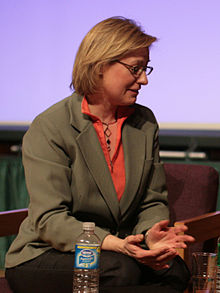罗莎琳德·皮卡德
外观
此条目可参照英语维基百科相应条目来扩充。 |
| 罗莎琳德·皮卡德 Rosalind Picard | |
|---|---|
 罗莎琳德·皮卡德在真理论坛(Veritas Forum)的科技与信仰话题中,讨论“让机器活起来:机器人能成为人类吗?”(Living Machines: Can Robots Become Human?) | |
| 出生 | 1962年5月17日 |
| 母校 | 麻省理工学院 |
| 网站 | web |
| 科学生涯 | |
| 机构 | 麻省理工学院 |
| 论文 | Texture Modeling: Temperature Effects on Markov/Gibbs Random Fields(1991) |
| 博士导师 | Alex Pentland Jae Soo Lim Sanjoy K. Mitter |
罗莎琳德·怀特·皮卡德(英语:Rosalind Wright Picard,1962年5月17日—)[1]是一位美国的学者和发明家,她是麻省理工学院担任媒体艺术与科学教授,也是麻省理工媒体实验室情感计算研究组的发起人、创业公司Affectiva与 Empatica 的联合创办人[2][3]。
生平
[编辑]她的研究和发明获得了许多认可。2005年,她获提名成为电气电子工程师学会的院士。[4] 2019年,她因在情感计算和可穿戴计算方面的贡献而当选为美国国家工程院院士,这是工程师获得的最高职业荣誉之一。[5] 2021年,她因在个人健康和福祉的生理讯号感应方面做出的贡献而被评为计算机协会 (ACM)院士。[6] 2021年,她当选为美国国家发明家科学院院士[7],该科学院旨在表彰对生活质量、经济发展和社会福利产生切实影响的杰出发明。2022年,她荣获国际伦巴第计算机科学研究奖 (International Lombardy Prize for Computer Science Research)[8],该奖项奖金为€100万欧元,她将这笔钱捐赠给数字健康和神经病学研究,以帮助挽救癫痫患者和易患婴儿猝死综合症的儿童的生命。[9][10][11]
皮卡德于1997年出版了同名著作《情感计算》,开创了计算机科学的分支学科—情感计算[12][13]。该书描述了情感在智力中的重要性、人类情感交流对人际关系的重要作用,以及机器人和可穿戴计算机识别情感的可能影响。[14] 她在该领域的工作拓展了自闭症研究,并开发了可以帮助人类识别人类情感细微差别的设备。[15]
参见
[编辑]参考资料
[编辑]- ^ Rosalind Wright Picard - Faculty Personnel Record (页面存档备份,存于互联网档案馆), Massachusetts Institute of Technology, November 30, 2017
- ^ Kerstetter, Jim. Building better Super Bowl ads by watching you watch them. CNET. 2013-02-02 [2013-02-03]. (原始内容存档于2013-06-06).
- ^ Crowdfunding medical devices raises money — and questions. [2018-04-18]. (原始内容存档于2018-04-13).
- ^ 2005 Fellows. IEEE Boston. 2005 [2008-05-05]. (原始内容存档于2008-05-17).
- ^ National Academy of Engineering elects 86 members and 18 foreign members. [2019-02-07]. (原始内容存档于2019-03-31).
- ^ ACM Names 71 Fellows for Computing Advances that are Driving Innovation. [2022-01-20].
- ^ National Academy of Fellows List. [2022-08-25]. (原始内容存档于2023-01-10).
- ^ Premio Internazionale Lombardia è Ricerca. [2022-11-09]. (原始内容存档于2022-11-10).
- ^ Rosalind Picard awarded with the Lombardy 'Nobel': Niguarda and Buzzi research projects with artificial intelligence to save lives. La Repubblica. [2022-11-11]. (原始内容存档于2022-11-11) –通过MSN. 已忽略未知参数
|lang=(建议使用|language=) (帮助) - ^ Lombardia is Research: the scientist Rosalind Picard awarded. 9 November 2022 [2022-11-11].
- ^ Lombardia and Research Award to Rosalind Picard:she will collaborate with Buzzi and Niguarda. [2022-11-11]. (原始内容存档于2022-11-11).
- ^
Kleine-Cosack, Christian. Recognition and Simulation of Emotions (PDF). October 2006 [May 13, 2008]. (原始内容 (PDF)存档于May 28, 2008).
The introduction of emotion to computer science was done by Pickard (sic) who created the field of affective computing.
- ^ Diamond, David. The Love Machine; Building computers that care.. Wired. December 2003 [May 13, 2008]. (原始内容存档于May 18, 2008).
Rosalind Picard, a genial MIT professor, is the field's godmother; her 1997 book, Affective Computing, triggered an explosion of interest in the emotional side of computers and their users.
- ^ Publication of Affective Computing. MIT Press. [2008-05-05]. (原始内容存档于March 28, 2008).
- ^ Nasr, Susan. Help for Autism: A new device teaches the interpretation of facial cues. MIT. November 2006 [2008-05-05]. (原始内容存档于2011-06-07).
